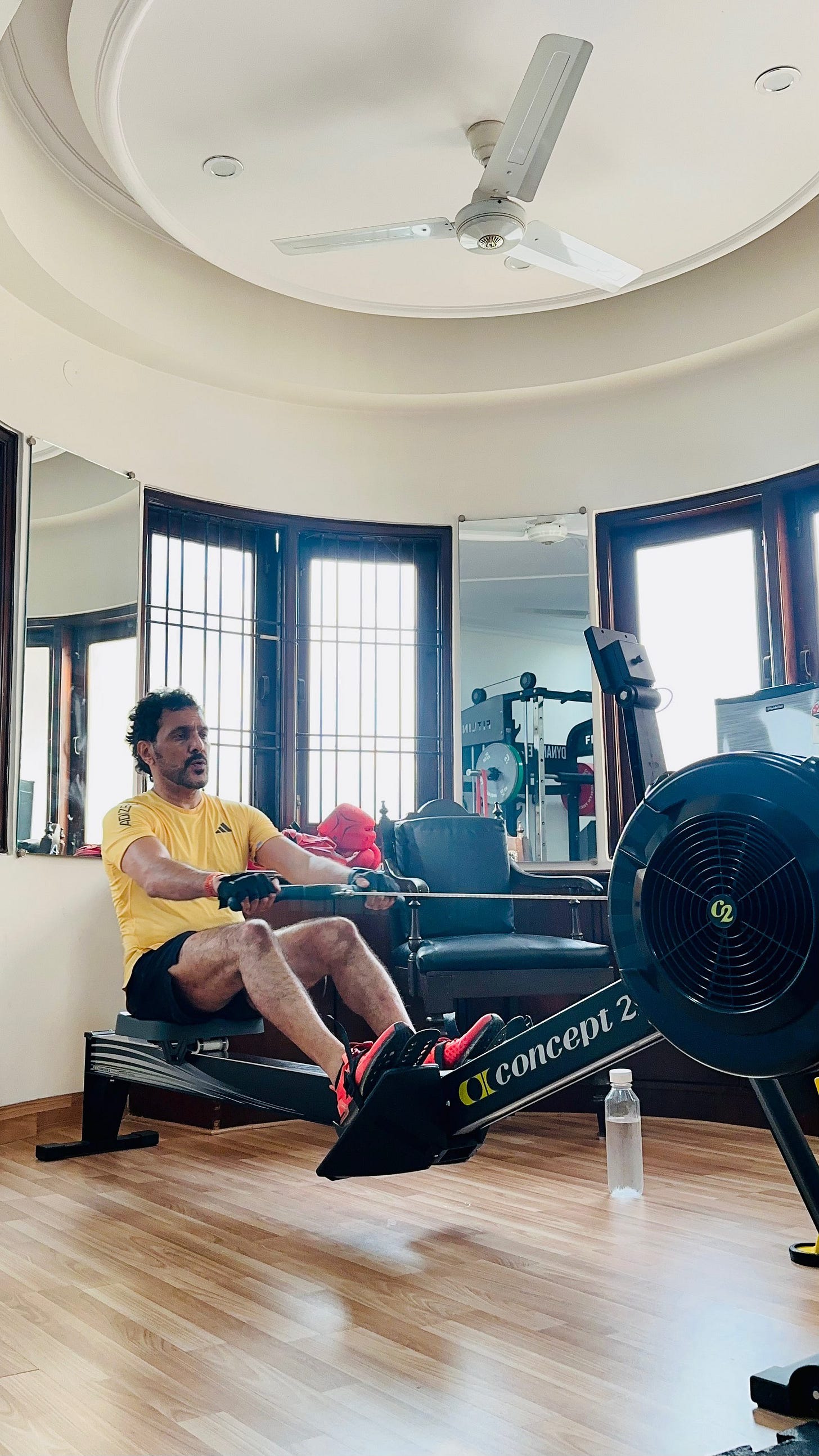The best way to stay consistent with your workouts is to prevent injuries - prioritise proper warm-ups, listen to your body, and master your form.
Exercise is an excellent way to enhance both physical and mental well-being. It strengthens your heart, boosts your mood, and helps maintain a healthy weight. However, pushing yourself too hard to achieve fitness goals can sometimes result in injuries. The good news is that many workout-related injuries are preventable!
This guide outlines nine practical strategies you can incorporate into your routine to minimise the risk of injury and ensure your workouts remain productive and enjoyable. By following these tips, you can train safely and effectively, maximize your results, and stay on the path to a healthier you.
1. Warm Up Like a Champion: Prepare Your Body for Optimal Performance
Think of your body as a finely tuned machine. Just as you wouldn’t start a car at full throttle without warming it up, the same principle applies to exercise. A proper warm-up increases blood flow to your muscles, enhances flexibility, and prepares your body for exertion. Aim for 5-10 minutes of light cardio, such as jumping jacks, jogging in place, or dynamic stretches that mimic your workout movements.
👉 Benefits of Warming Up
Increased Blood Flow: Delivers oxygen and nutrients to your muscles, improving performance and reducing strain risk.
Enhanced Flexibility: Allows for a greater range of motion, decreasing injury risk.
Mental Preparation: Helps you get in the right mindset for the workout ahead.
2. Listen to Your Body: Your Built-In Injury Prevention System
Your body communicates with you; learn to interpret its signals. Recognise the difference between the good “burn” from working a muscle and sharp pain that indicates something is wrong. Don’t push through pain—reduce intensity, take a break, or modify the exercise if discomfort arises. Pain is your body’s way of signalling that you need to slow down or stop.
👉 Importance of Body Awareness
During Exercise: Pay attention to how your body feels. Muscle soreness is normal, but sharp pain is not.
Preventing Injuries: Acknowledge your limits and adjust your workout accordingly to prevent injuries.
3. Master Proper Form: Technique is Essential
Using proper form during exercises is crucial for injury prevention. Many gyms offer introductory classes or consultations with trainers who can teach you the correct techniques. If you’re unsure about an exercise, don’t hesitate to ask for guidance. While instructional videos are helpful, personalised instruction from a qualified trainer is invaluable.
👉 Benefits of Proper Form
Maximised Effectiveness: Correct technique ensures you target the intended muscle group.
Reduced Joint Stress: Minimises unnecessary stress on your joints and muscles.
4. The Power of Gradual Progression: Slow and Steady Wins the Race
It’s tempting to dive in and go all out, especially when feeling motivated. However, increasing intensity or weight too quickly can lead to injuries. Instead, adopt a gradual progression strategy. Start with lighter weights or lower repetitions and gradually increase them as your strength improves.
👉 Dangers of Overdoing It
Stress on Muscles and Joints: Rapidly increasing intensity or weight can cause injuries.
Safe Adaptation: Gradual progression allows your body to adapt safely, building strength and stamina.
5. Befriend the Mighty Rest Day: Allow Your Body to Recharge
Rest and recovery are just as important as the workout itself. During rest days, your body repairs damaged tissues and rebuilds muscle strength. Aim for at least one rest day per week, and listen to your body for additional rest when needed. Overtraining is a significant cause of injuries.
👉 Importance of Rest and Recovery
Muscle Repair and Growth: Adequate rest allows your muscles to recover and grow stronger.
Preventing Fatigue: Without rest, fatigue sets in, increasing the risk of injury.
6. Fuel Your Fitness Machine: Eat for Performance and Recovery
Your body requires proper fuel to perform optimally. Consume a balanced diet rich in fruits, vegetables, whole grains, and lean proteins to provide essential nutrients for muscle recovery and growth. Staying hydrated is equally important, especially before, during, and after workouts, as dehydration can lead to muscle cramps and fatigue.
👉 Nutritional Needs for Exercise
Balanced Diet: Provides the building blocks for muscle repair and growth.
Hydration: Ensures proper blood flow and muscle function.
7. Listen to Your Limits: Know When to Push and When to Ease Up
Recognising your limitations is crucial. Avoid lifting weights that are too heavy or pushing yourself beyond your current fitness level. Modifying exercises or taking breaks is perfectly acceptable. It’s better to be safe than sorry.
👉 Respecting Your Limits
Challenging Yourself: Beneficial but should be within safe boundaries.
Safe Training: Tune into your body’s signals and adjust your workout accordingly.
8. Invest in Supportive Gear: Dress for Success and Safety
Proper footwear is essential for preventing injuries. Choose shoes designed for your specific activity, whether running, lifting weights, or cross-training. Supportive shoes provide cushioning and stability, reducing stress on your joints. Consider using additional supportive gear like wrist wraps for wrist-intensive exercises or a weightlifting belt for heavy lifts.
👉 Role of Proper Gear
Reduced Injury Risk: Properly designed shoes and supportive equipment enhance safety.
Effectiveness: Ensures effective training with reduced risk.
9. Stretch It Out: Enhance Flexibility and Reduce Muscle Soreness
Cooling down with static stretches after your workout improves flexibility, prevents soreness, and maintains joint health. Hold each stretch for 15-30 seconds, focusing on deep, controlled breathing. Regular stretching enhances flexibility, allowing for a wider range of motion during exercises.
👉 Benefits of Stretching
Reduced Soreness: Helps elongate shortened muscles, reducing stiffness.
Improved Flexibility: Leads to better performance and lower injury risk.
👉👉Video Links for Further Guidance:
How to build up your workout routine
Dr Andrew Huberman as a series of podcast with Andy Galpin, Dr Peter Attia and others on various aspects of exercise.
Feel free to explore these links to enhance your understanding and implementation of these principles. By incorporating these strategies into your fitness routine, you can minimise the risk of injury and enjoy a more productive and enjoyable workout experience.
In case you missed previous issue on Unlocking Your Potential, here are the five learnings:
First Impressions Matter: Making a strong first impression is crucial in the professional world. Being prepared and authentic in your interactions sets a positive tone for future relationships. This includes dressing appropriately, maintaining eye contact, and practicing your introduction to ensure you come across as genuine.
Physical Health is Essential: Prioritising physical health through regular exercise can significantly impact your career performance. It boosts energy levels, enhances focus, and improves overall well-being, which helps you handle work challenges more effectively.
Active Listening Enhances Communication: Engaging fully in conversations by practicing active listening—such as summarising what others say and asking open-ended questions—builds stronger relationships and fosters better collaboration in the workplace.
Public Speaking Skills are Crucial: Developing strong public speaking skills can elevate your career by increasing your visibility and leadership presence. Practicing regularly and seeking feedback can help you become a more confident and effective speaker.
Financial Literacy Reduces Stress: Understanding personal finance and managing your budget can relieve stress and help you make informed career decisions. Building financial literacy over time allows you to focus more on your career and less on financial concerns.
Career Cheat Codes: Unlocking Your Potential
In the fast-paced world of career advancement, it's easy to feel like you're playing a game without a cheat sheet. However, with the right strategies and mindset, you can level up your professional life and achieve your goals faster than you thought possible.
Before you go!
Did you like this issue? If yes, consider dropping your love on the socials and sharing it with anyone who you think will benefit from it.
See you on the thirty seventh Sunday of 2024. Take care!





